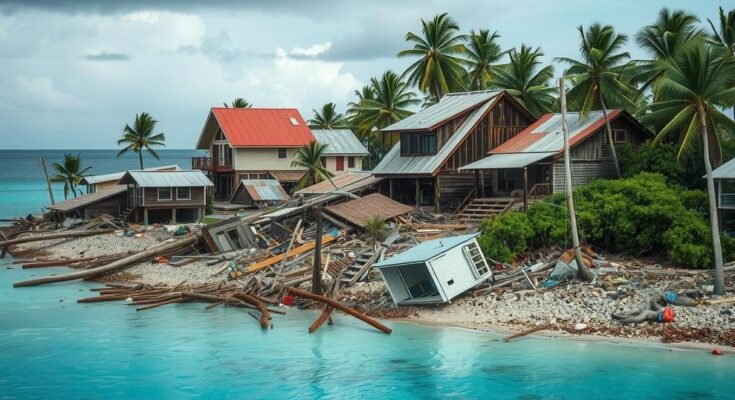Cyclone Chido has caused hundreds of deaths in Mayotte, with estimates potentially nearing 1,000. The territory has experienced extensive damage, prompting emergency responses from France. The cyclone has also affected Mozambique, highlighting the ongoing risks associated with climate change during the annual cyclone season.
The French territory of Mayotte has suffered devastating effects from Cyclone Chido, with officials estimating the death toll at several hundred, possibly approaching 1,000. This tropical cyclone struck the region on Saturday, leading to significant destruction and displacements. Initially, there were reports of at least 11 confirmed deaths, which are expected to rise as rescue efforts continue amidst challenges in accessing remote areas. Mayotte Prefect François-Xavier Bieuville described this catastrophe as the worst cyclone to hit the islands in 90 years.
As Cyclone Chido continued its path, it has already made landfall in Mozambique, where organizations are preparing for further losses among the estimated 2.5 million people potentially affected in the northern provinces. The cyclone’s winds reached over 220 kilometers per hour, categorizing it as a severe category 4 cyclone. Following its landfall, emergency services and military personnel have been dispatched to provide assistance and prevent looting.
The destruction in Mayotte has raised concerns about the long-term impact on public infrastructure, as essential facilities including hospitals and airports have been damaged. In response, the French government has mobilized rescuers from Reunion and provided military aircraft and ships for aid delivery. French President Emmanuel Macron is monitoring the situation closely, while Pope Francis has expressed his condolences for the victims in a recent visit to Corsica.
The region is currently in cyclone season, typically spanning from December to March. Previous cyclones in recent years, such as Cyclone Idai and Cyclone Freddy, have underscored the growing intensity and frequency of such natural disasters, in part attributed to climate change. Experts warn that the aftermath of Cyclone Chido poses risks of further humanitarian crises and reinforce calls for international support to mitigate the effects of climate change in vulnerable nations.
Cyclones are increasingly prevalent in the southeastern Indian Ocean and southern African regions during the cyclone season, which typically lasts from December to March. Recent history has shown a trend of increasingly severe cyclones, with previous storms such as Cyclone Idai and Cyclone Freddy causing significant loss of life and extensive damage. Additionally, the impacts of climate change are said to exacerbate the frequency and severity of these natural disasters, placing immense strain on countries such as Mayotte, the poorest territory in the European Union. This context makes understanding the recent cyclone’s impacts critical, as the region seeks to navigate the associated humanitarian crises and calls for international support.
In conclusion, Cyclone Chido has wrought significant havoc on the French territory of Mayotte, resulting in a tragic loss of life and severe infrastructure damage. With the estimated death toll possibly nearing 1,000, immediate aid efforts are underway to assist the affected populations. As the situation develops, it serves as a stark reminder of the increasing threats posed by climate change and the urgent need for global cooperation in addressing these challenges.
Original Source: www.pbs.org




